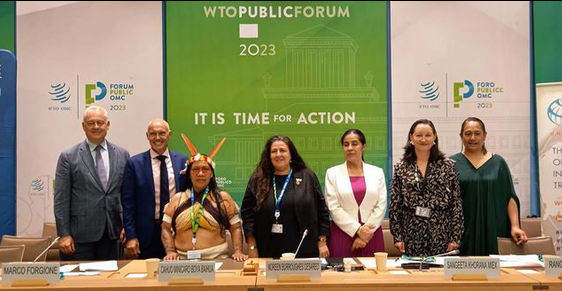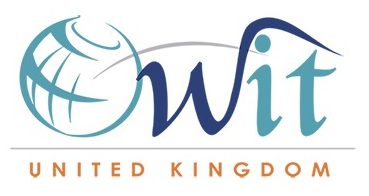OWIT UK Cohosts WTO Public Forum Session: Catalysing Green Trade: Indigenous Women Entrepreneurs Shaping Sustainable Policies

A delegation from OWIT UK attended the WTO Public Forum “ It’s time for Action”, in Geneva this year between September 12 and 15 2023. OWIT UK co-hosted a panel discussion with The Institute of Export & International Trade (IOE&IT) and the Permanent Embassy of Ecuador to the WTO on “Catalysing Green Trade: Indigenous Women Entrepreneurs Shaping Sustainable Policies”.
https://www.amwae.org/Our panel of speakers included:
- Cahuo Minicaro Boya Baihua, President, Waorani Women’s Association of the Ecuadorian Amazon (AMWAE)
- Noreen Burroughes Cesareo FRSA, President, OWIT UK
- Rangimarie Hunia, Chair, Te Ohu Kaimoana
- Sangeeta Khorana MIEx, Professor of Economics, Aston University
- And moderator: Marco Forgione, Director General, Institute of Export & International Trade
We were also joined for the conversation by HE Ambassador Clare Kelly, New Zealand Permanent Representative to the WTO, Minister Daniel Legarda, Ministry of Foreign Trade, Government of Ecuador, HE Ambassador Simon Manley from the Permanent Mission of the United Kingdom in Geneva and HE Ambassador José VALENCIA, Ecuador Permanent Representative to the WTO.
Session Discussion
How can we create a space for leadership and representation for indigenous women in green trade?
The following highlights the key points of that conversation, including some key and practical learnings from our panellists in terms of the important contributions from indigenous and women entrepreneurs in the way sustainable trade can be developed, and how Business Support Organisations such as OWIT can help them trade effectively and become part of supply chains.
A fact we cannot ignore is that the impact of the climate crisis disproportionately affects women, particularly those who rely on agriculture for their livelihoods.
We all agree: trade is a force for good, and international trade has a key role to play in reaching and supporting a sustainable future.
In this context, there is a group of people that can play a key role in developing sustainable trade. As valuable contributors to addressing climate change, our panelists shared learnings from indigenous women’s green practices and experiences.
The Women from the Amazon’s Waorani tribe in Ecuador
The Waorani’s leader Cahuo spoke about how the association started in the Ecuadorian Amazonian forest with only six women ten years ago and grew into a network of 58 communities – engaging more than a thousand women working together as guardians of the Amazonian forest. In this community, the leaders – typically men – have supported women’s empowerment and recognised their role in preserving nature and culture. The Government of Ecuador also supports and monitors the initiative as a benchmark for regional knowledge management and scaling high-impact solutions in the region.
AMWAE (Association of Waorani Women of the Ecuadorian Amazon) maintains an ecological production of cocoa harvesting, drying, and fermentation processes, which they carry out using traditional and organic methods, making it a conservation project that prevents deforestation. It is also a measure of fauna protection and a path for sustainable local development. A locally outsourced process transforms the cocoa beans into chocolate bars with excellent taste and packaging. The women’s communities also make beautiful crafts, such as baskets and bags using natural fibers, and other home décor items.
Thanks to AMWAE, these small artisans became a large entrepreneurial group, overcoming cultural and language barriers. The association sells these products in two local dedicated community shops and also features in gift shops of selected high-end hotels.
The women’s leadership, their focus on their collaborative group and their abilities to preserve and transmit their language, cultural and ancestral know-how to the children and youth have made this community thrive.
The Māori Women In New Zealand
On the other side of the world, another influential leader Rangimarie Hunia, acknowledged the shift in New Zealand’s Government policies that now recognize the Māori’s fishing communities and cultures.
In the Maori fishing community, women do shape decisions. Rangimarie is the first woman leader of the Te Ohu Kaimoana (Māori Fisheries Trust) of New Zealand that represents a 17 billion dollar industry. The Trust boasts a stronger women’s representation claim, improved economic returns , and greater women’s empowerment.
In line with their goals, Rangiemarie leads the movement that has allowed women to actively participate in fisheries management, increasing income earned for their communities. For example, Rangemarie explained that in Aotearoa New Zealand, fishing forms an integral part of Māori custom and tradition and historically the guardianship and responsibility towards living things ensures careful management through the use of Māori knowledge and correct, sustainable fishing practices.
Rangimarie also emphasised that we must pay more attention to the role of men in recognising and supporting women’s work in fisheries toward creating equitable and sustainable fisheries.
Ambassador Kelly from the WTO’s New Zealand Mission highlighted the support that the Government provides to the Māori fishing communities as part of its broader support for indigenous economic empowerment and the promotion of inclusive and sustainable trade. She stated that 47 percent of the fishing quota in New Zealand is reserved for indigenous people and communities.
The Role Of Business Support Organisations, Finance And A Strong Ecosystem
Another important element to consider is access to finance: this was a strong point conveyed by Noreen Burroughes Cesareo. It is important for indigenous women, women entrepreneurs and international trade to have access to support in the shape of finance, and even better: tailored finance. However, finance on its own is not enough. There must also be an accompanying programme that considers digital and business skills, capabilities building and training – with a thriving ecosystem that functions through the entire supply chain. This is where the role of business support organisations (BSOs) like OWIT International and its various chapters around the world becomes an important part of that ecosystem. They can step in and create a collaborative environment to bring the right support to each business, depending on their growth stages, their markets and their ambitions.
Sangeeta Khorana, Professor of Economics at Aston University and Trustee Director and Chair of the Academic Board at the IOE&IT, made a powerful statement about the need for comprehensive research to have reliable data on indigenous women’s trade and the need for women’s representation at the table. Data is vital for policy making and decision taking. Only then can we make progress.
Transforming Individual Lives, Communities And Nations
When introducing this panel Marco Forgione spoke about how a female entrepreneur not only delivers economic profit for herself and her business but has a transformative role for her community. International trade from indigenous women has the power to transform individual lives, transform communities and transform nations. It safeguards a heritage and ensures a strong future while allowing communities to grow and participate in a global economy.
The Importance of These Discussions at The WTO Public Forum
The WTO’s Public Forum creates a space for dialogue among civil society and policymakers. The presence and contribution from the various representatives of missions and embassies at the WTO showed the importance of this working session.
The United Kingdom, under the leadership of Ambassador Manley, also the current Chair of the WTO Working Group on Gender, participated in the discussion, acknowledging the strong link between inclusion and green trade. As Ambassador Manley said, “Indigenous people have the secret of how to make trade green, and insights for a win-win future…” Let’s continue to bring them into the current and future conversations to build a sustainable and green international trade.
This participation formed part of OWIT UK’s agenda on capacity building and trade facilitation, two of the pillars of OWIT UK’s programme within the UK and internationally. Feel free to contact us on admin@owituk.org for further information on OWIT UK membership, our forthcoming events, or if you are interested in becoming a sponsor or partner.
Contributors to this blog:
Veronique Rapetti, VP, Partnerships, OWIT UK
Fiorina Mugione, OWIT UK Advisory Board and GDSI Senior Consultant
Renee Russo – OWIT UK intern
Technical Team for the WTO Public Forum 2023 from OWIT UK
Noreen Burroughes Cesareo, President, OWIT UK
Nicole Pitter Patterson, VP International, OWIT UK
Fiorina Mugione, OWIT UK Advisory Board
Dr Ashraf Bocktor, Senior Project Co-Ordinator OWIT UK
